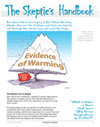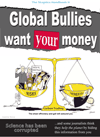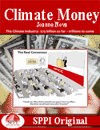|
|
An ER doctor decided he wants to write down “the root cause” at least as far as an ER doctor reckons. He’s not well versed in climate model infrastructure, hasn’t scanned for tropospheric hot spots, or Precambrian CO2 extremes, but he’s watched CNN so why not?
h/t Climate Depot
Let’s yank this chain and run with it:
B.C. doctor clinically diagnoses patient as suffering from ‘climate change’
Times Colonist
The head of a Nelson, B.C., emergency department says it’s time doctors start looking at the underlying cause of medical conditions triggered by smoke and heat.
For the first time in his 10 years as a physician, the ER doctor picked up his patient’s chart and penned in the words “climate change.”
“If we’re not looking at the underlying cause, and we’re just treating the symptoms, we’re just gonna keep falling further and further behind,” he told Glacier Media when asked why he did it.
It was late June, and British Columbia was trapped under a heat dome that even NOAA says was due to La Nina, not because of a coal plant in Guangdong. So the unfortunate lady in her 70s that […]
Skeptics have known for years that Nature was more about fashion than science. A parody from 2019.
When it comes to scientific truths, even in top journals like Science and Nature, the more wrong it is, the more it gets cited. Even after other researchers have failed to repeat it, and been published saying so, the citations don’t slow down. Almost 9 out of 10 of the new citations keep citing it as if it were still correct. Who said science was self-correcting?
It’s so bad that the junkier articles in Nature and Science that couldn’t be replicated were cited 300 times as often as the more boring papers that could be replicated. In other words, the supposedly best two science journals, and the industry that reads them, have become a filter for eye-candy-science-junk.
And it was all so predictable — with the fixation on “counting citations” as an inane substitute for analysis: we got what we didn’t think about. The drive to get citations and media headlines means the modern industry of science has become a filter to amplify sensationalism, not science.
Science is a form of entertainment, not a search for the truth.
A new […]
Welcome to the DroneAge, where people act like robots and share dumb ideas at light speed! Episode #601: Climate change makes you lonely and fat.
Feeling friendless, floppy and like a loser? It’s not your fault. Blame a coal plant. Blame Exxon. Blame anyone but yourself. It’s your bad luck to be born into the most bountiful, benevolent era in human history. Damn!
Lonely, unfit and hooked on air-conditioning – is this the summer of the future?
Nicole Hasham, Sydney Morning Herald, uses new unorthodox indicators of “climate change”. Wait for it… test cricket attendance? It’s a smorgasbord of nonsense:
In Perth, cricket fans avoided an historic Test fixture amid predictions of 38-degree days. Sun melted a coastal highway filled with holidaymakers in northern NSW. Victoria’s coal generators shut down. Tasmania burned. And rotting fish corpses lining the Darling River at Menindee forced anglers to seriously rethink their plans.
Are we kidding? Thirty-eight degrees is just a summer’s day in Perth. It’s something that happens 19 years out of 20. As for coal generators shutting down: we’ve spent 20 years trying to drive them out of business to stop climate change, and now, if they don’t work, that […]
John Cook tries to attack skeptics for their savage jokes about cold spells. Go for it John, we’ll believe you when you when you stop publishing stories about single hot days and tell PhD’s they shouldn’t harp on about random noise like heat waves:
Forecast: flurries of shivering climate-change deniers
When a cold spell struck the east coast recently, US President Donald Trump tweeted “Wouldn’t be bad to have a little of that good old fashioned Global Warming right now!”
The argument he is sarcastically implying and often makes—that global warming isn’t happening because it’s cold outside—possesses an obvious logical flaw. [No kidding]. It’s like arguing that the sun no longer exists when it gets dark at night. Of course, Trump didn’t invent this argument—it’s commonly brought up on denier blogs and social media threads whenever the weather turns cold.
This type of fallacious reasoning is not just common on believer blogs, it’s their bread and butter.
Trump was being sarcastic. Skeptics are making jokes — but what excuse can anyone make for paid PhD’s who are serious?
Let’s swap the hot’s and cold’s of Cooks own words (mine bolded):
The argument PhD’s seriously […]
Verily. Eclipses do weird things to people.
Justin Gillis, writer for The New York Times used the recent eclipse to sell something I’d call Sciencemagic. Essentially, if some Scientists™ can calculate orbital mechanics to a fine art, it follows, ipso nonfacto, that all people who use the same job title are also always right.
“Should You Trust Climate Science? Maybe the Eclipse Is a Clue”
Thanks to the work of scientists, people will know exactly what time to expect the eclipse. In less entertaining but more important ways, we respond to scientific predictions all the time, even though we have no independent capacity to verify the calculations. We tend to trust scientists.
If Scientists™ say that solar panels will stop malaria, then buy some! Save lives in Ghana. (What are you waiting for?)
The implications stretch far. Clearly, we can chuck out the whole research thing (labs, who needs em?) Why test predictions, if Scientists™ are 100% accurate? We’ve been wasting money. We don’t need more large hadron colliders, we just need to survey more particle physicists.
This idea that job titles have a kind of truth-telling power is not much different to astrology where truth […]
(Click for the full advert)
The Climate Study Group is trying a new approach with an Advert in The Australian on page 7 today. Or rather, you might say this is a very old approach…:
Socrates Nice to meet you Mr Smith. I hear you are very concerned about dangerous global warming.
Mr Smith Yes, we are facing an alarming prospect of a global warming catastrophe.
Socrates What gives you such concern?
Mr Smith Emissions of CO2 from burning fossil fuels.
Socrates How were these fossil fuels formed?
Mr Smith Various plant forms grew, died and formed fossil fuels before and during the Carboniferous Period.
Socrates Was there dangerous global warming prior to the Carboniferous Period?
Mr Smith No. There’s no evidence of dangerous global warming prior to the Carboniferous period.
Socrates So where did the carbon in fossil fuels originate?
Mr Smith Plants absorbed CO2 from the atmosphere prior to the formation of fossil fuels.
Socrates So the CO2 absorbed by plants is now being released from burning fossil fuels.
Mr Smith It must […]
Matt Ridley has produced the shortest whole, killer summary of the sordid state of climate science, science journalism, and science associations for Quadrant magazine. This is the ideal single-chapter-length-work to bring in anyone who missed the last twenty years of clima-farce, scandal, hubris and hypocrisy.
Matt is not just summing up the way his career as a science writer has transformed, but also writing the best review of the IPA book “Climate Change: The Facts” that I have yet seen. He talks about the way science writers used to ignore the papers that didn’t impress them, and leave it up to the scientists to take them apart, but now the supposedly most esteemed scientists stay silent while abject failures not only get published in the scientific world, but get absurdly lauded in the media, and tweeted by “the President”. Formerly great scientific institutions have turned themselves inside out:
“The Royal Society once used to promise “never to give their opinion, as a body, upon any subject”. Its very motto is “nullius in verba”: take nobody’s word for it. Now it puts out catechisms of what you must believe in. “
Matt’s career, like mine, started with faith that […]
Consensus — slowing real science for decades
There is a surprising amount of interest in the cholesterol story of Matt Ridley’s in The Times and The Australian last week. Surprising to me anyway, because 15 years ago the other benevolent side of cholesterol was pretty clear online. Fifteen years is not a long time in human civilization, but it’s a long time in a human life. And in the case of the war on cholesterol, it’s been running for 40 years. How many people died sooner than they would have, because they followed expert advice?
Finally the official consensus on cholesterol is admitting defeat:
“Any day now, the US government will officially accept the advice to drop cholesterol from its list of “nutrients of concern” altogether. It wants also to “de-emphasise” saturated fat, given “the lack of evidence connecting it with cardiovascular disease”. “
In the late 1990’s it was widely known online (among health zealots) that our livers are mostly in charge of our cholesterol levels, not what’s on our dinner plates. Something like 80% of the cholesterol in our blood came from our own livers, not the food we eat. Way back then, it was […]
Naomi Orsekes’ big intellectual contribution to the climate debate is her fantasy that skeptics copy tactics from the tobacco lobby. It’s a trick to reframe real criticism — Dr A spots a real error, but Oreskes waves the “Tobacco tactic!” red flag. Stop the conversation!
Not only are these ad hom attacks tactics as old as the stone age, bone obvious, and used in every political hot-potato debate, but “tobacco tactics” are the stock and trade of Prof Naomi Oreskes. She’s make a whole career out of mimicking the tobacco industry.
Oreskes wrote an entire book designed to denigrate scientists based on tenuous links on unrelated topics with 20 year old documents. She is The Merchant of Doubt — it’s what she sells — “doubts” about the motivation of skeptical scientists. Her fantasies about skeptics using tobacco tactics is pure psychological projection. Perhaps she isn’t aware?
In a science debate about the climate, the only things that matter are evidence and reasoning about the climate. Those who can’t point out flaws in the science debate launch personal attacks from the gutter instead. What has tobacco got to do with Earth’s Climate? It’s not a forcing or a feedback, but the […]
Most of the results reported in peer reviewed literature in medicine are mere artefacts of poor methodology, despite being done to more exacting standards than climate studies. There are calls in the medical literature for all data to be made public and for higher P values to be required. (Yes please say skeptics everywhere). Miller and Young recommend that observational studies don’t be taken at all seriously until they are replicated at least once. That would have ruled out the original HockeyStick two times over.
Even the absolute best medical papers are wrong 20% of the time, but mere observational studies (like climate research) failed 80 – 100% of the time. These studies of papers demonstrate why anyone who waves the “Peer Review” red flag is in denial of the evidence — “Peer Review” is not part of the scientific method. It’s a form of argument from authority. A fallacy of reasoning is still a fallacy, no matter how many times it is repeated. Those who claim it is essential or rigorous are not scientists, no matter what their government-given title says.
GEN, Genetic Engineering and Biotechnology News, May 1, 2014, Point of View
Are Medical Articles True on […]
So much for the consensus. In 2012 The Geological Society of Australia (GSA) was one of the few associations to make a slightly skeptical position on climate. For poking their heads above the parapet they’ve had years of headache and debate, and finally have issued a statement saying they have given up entirely on putting out any statement. The debate is so furious and divisive that no position could be agreed on. (I wonder exactly how many of their members are fans of climate models? Was this the work of just a few zealous believers?) I think I’ve hardly ever met a geologist who wasn’t somewhat skeptical.
The back story is that, like most science associations, in 2009 the GSA chanted the litany. (Their 2009 statement is here). They wrote that governments should take strong action to reduce CO2 and that meant paying geologists more to do research and sit on plum advisory committees. How predictable…
1. That strong action be taken at all levels, including government, industry, and individuals to substantially reduce the current levels of greenhouse gas emissions and to mitigate the likely social and environmental effects of increasing atmospheric CO2.
2. That Earth Scientists with appropriate expertise […]
A miracle has occurred, climate models which have been plagued with failure and have finally been gifted with The Scientific Truth. Apparently the God of Weather has visited upon Matthew England and others. (We wonder why God didn’t visit earlier, but are grateful for this insight.)
The climate models didn’t predict Antarctic sea ice extent trends. Polar amplification was supposed to mean it would warm twice as fast at the poles, yet inconveniently after years of massive output of CO2 — above the levels assumed in the models — Antarctic sea ice has hit another record high. Finally in the eighth round of making excuses for their excuses, the Scientific Truth has emerged to sweep away the scientific untruths that went before. (After all, climate models couldn’t possibly have been expected to understand heat flow around the planet could they?)
The yellow line shows how much rain Antarctica is stealing and dumping as sea ice. If you turn on your tumble drier the penguins in Antarctica have to walk further.
Ocean winds keep Antarctica cold, Australia dry Science Daily May 11, 2014 Source: Australian National University
New research has explained why Antarctica is not warming as much as […]
It’s another pious scientist. Sigh.
Why do good researchers sometimes throw their professional standards to the wind (or in this case, just blow them right up?)
Fiona Stanley has done great work in the prevention of spina bifida with folic acid, and with indigenous health problems. The new big state funded hospital in WA is named after her, and she’s another Australian of the Year. (Is that award the worst thing that can befall a good scientist? Post hoc, they seem to think the world wants to know their personal feelings on topics they know nothing about.) Cue Professor Fiona Stanley who assumes all fields of science “work” even though she herself says climate science is politicized.
Stanley goes so far as to say that being skeptical of the IPCC view is like “child abuse”. But isn’t it a form of child abuse to throw away the Scientific Method, to sacrifice the next generation’s quality of life, their careers and then burden them with debts to the the God of Wind-farms and the Saint of Pink Batts? Don’t we owe our kids the transfer of a culture of logic and reason that was handed to us?
At least Stanley admits […]
Müller lite: Why Every Scientist Needs a Classical Training
By Christopher Monckton of Brenchley About 18 months ago, as soon as I heard of Dr. Richard Müller’s Berkeley Earth Temperature project, I sent an email to several skeptical scientists drawing their attention to his statement that he considered his team’s attempt to verify how much “global warming” had occurred since 1750 to be one of the most important pieces of research ever to be conducted in the history of science. This sounded too much like propaganda.
“…from 1695 – 1735 Central England warmed seven times faster than what Muller finds in the 262 years during which we are supposed to have influenced the weather.”
He was posing, I said, as a skeptical scientist; his results would broadly confirm the pre-existing temperature series; when his research ended, he would declare himself to have been converted from scepticism to the belief that merely because the world had warmed the warming must be our fault; and publication of his results would be exploited as a triumphant and final confirmation of the “global warming” orthodoxy.
My doubts about Dr. Müller’s motivation intensified after I met him at the Los Alamos Climate Conference in Santa […]
Joint Post David Evans and Jo Nova
“97 percent of climate experts say man-made global warming is a major threat”
The correct response: “So? The satellites, ocean buoys, and weather balloons disagree.”
The alarmists may have “experts”, but the skeptics have the data.
How do you find the truth about some disputed point in science? You find the most authoritative source of information. The vital thing that makes science different to a religion is that there are no “Gods” of science. There is no expert who is infallible. The highest authority in science is the measurements and observations. Here is the hierarchy of authority in climate science:
Data (empirical evidence) Climate scientists Other scientists Lay people.
For most of the last few centuries, science has been supreme over politics for settling the truth in matters pertaining to the physical world—empirical evidence beats anyone’s say-so.
But the modern political approach is to ignore that top level. To most warmists and the public who “believe in climate change” (as they so misleading say), the hierarchy is:
Climate scientists Other scientists Lay people.
The way the climate scam works is for the like-minded western bureaucracies to […]
Naomi Klein Photo: Mariusz Kubik
Naomi Klein was the wrong person to send to a heavy-weight science conference — in “Capitalism vs Climate” she notices hundreds of details, but they’re all the wrong ones.
Naomi can tell you the colour of the speakers hair, what row they sat in, and the expression on their face — it adds such an authentic flavor to the words, but she’s blind to the details that count. She can explain the atmosphere of the room, but not the atmosphere of the Earth. One of these things matters, and Klein has picked the wrong one.
Her long attack on the Heartland ICCC conference this year is all color and style, and nothing of consequence — the lights are on and no brain is home. Unpack the loquacious pencraft and we wallow in innumerate arguments that confuse cause and effect, peppered with petulant name-calling. She can throw stones, but she can’t count past “one”.
Her aversion to numbers is crippling
Consider how she reduces planetary dynamics to a Yes or No answer. She thinks each skeptical scientist contradicts the next: “Is there no warming, or is there warming but it’s not a problem? And if […]
You have to feel sorry for him. He’s genuine. He’s stressed to the point of mania. And it’s all for nothing.
But as Brice Bosnich says, Hilarious; bring the back to front canvas jacket, rubber spoon…
Greg Craven posted his infamous AGU speech and asked us to share it. Craven is absolutely right in a chain of logic except for one ever so small point, in the first link. His chain is anchored to his Gods of Science. He doesn’t question authority. Everything else is an error cascade, and he’s over the waterfall. He’s just done Niagara in a tin-can.
I hope he makes it.
The irony is he’ll devote hours to “understanding” the official establishment version of events, and three years working non-stop to promote that, but nothing to understanding why people are unconvinced. He’s living in the matrix — he thinks the punters are dumber than him, and they’re being exploited by a “ruthless denial machine” — meanwhile his religious zeal, and blind faith in authority is passively exploited by a ruthless power-seeking money-hungry machine.
Shame, if only someone had taught him the fallacy of argumentum ad verecundiam. All those good intentions could be used to help […]
The New Yorker has such an interesting article it’s already generating discussion here, so it deserves a thread of it’s own. It describes a true modern paradox, namely that so many good studies can show interesting “significant” results, yet very few of these turn out to be genuine repeatable findings, and frustrated researchers struggle to get similar results, and it’s almost as if, the harder they try, the worse it gets. Many researchers across disparate fields are noticing an odd trend that the effect they thought was so solid, appears to mysteriously “wear off” as the years and the repeat trials go on.
It’s a sober warning to all of us to search hard for the truth hidden behind variables we are not even able to name yet, let alone measure, and to be ever vigilant about variables we can name, like “publishing bias” and “selective reporting”.
Annals of Science The Truth Wears Off Is there something wrong with the scientific method? by Jonah Lehrer December 13, 2010
These are quick quotes from a 5 page article. It’s well written, and worth reading in full.
But now all sorts of well-established, multiply confirmed findings have started to look […]
Great news: This commentary appears in The Weekend Australian today (in a slightly different edited version). Below was what I submitted, before the edits, with the links intact. Comments are open at The Australian. I’ll be posting less often over the Southern Summer, possibly quite irregularly, so if you want to get an email from me and find out when the more important posts go up, please add your email to my list (top right, see “register”).
In the print edition the headline is “Journalists who think Newspapers should lead the country”*
David McKnight’s criticism of The Australian (Sceptical writers skipped inconvenient truths) makes a good case study of the intellectual collapse of Australian universities.
Here’s a UNSW “Senior Research Fellow” in journalism who contradicts himself, fails by his own reasoning, does little research, breaks at least three laws of logic, and rests his entire argument on an assumption that he provides no evidence for. Most disturbingly — like a crack through the façade of Western intellectual vigour — he actually asserts that the role of a national newspaper is to “give leadership”. Bask for a moment in the inanity of this declaration that newspapers “are our leaders”. Last […]
…
It’s Naomi Oreskes reasoning which is scary.
Some people just can’t think.
Naomi Oreskes “reasons” by Remarkable Parallels, which is as bogus a way of thinking as any tea-leaf-incantation that we thought we left behind in the caves. She thinks that because she can find parallels between Tobacco and Climate Skeptics, therefore skeptics are wrong about climate sensitivity due to a trace gas. Go figure why anyone struggles to analyze ice cores when they could have just done a Google search?
I can find remarkable parallels between Lysenko and modern climate science, but I don’t bother writing a book on it. If I want answers about the climate I look at the data from the planet, not data about personalities.
Mike Steketee (Some sceptics make it a habit to be wrong) has learnt a new way to throw names from Oreskes. Nick Minchin (recently retired Senator from the conservative opposition) is just the latest target of this effusion of confusion.
Now anyone who raises points against a policy can be called a “doubt-monger” and the Orwellian destruction of our language advances one more notch.
Naomi Oreskes IS the Merchant of Doubt
Ponder the irony of what Oreskes herself […]
|
JoNova A science presenter, writer, speaker & former TV host; author of The Skeptic's Handbook (over 200,000 copies distributed & available in 15 languages).

Jo appreciates your support to help her keep doing what she does. This blog is funded by donations. Thanks!


 Follow Jo's Tweets
Follow Jo's Tweets To report "lost" comments or defamatory and offensive remarks, email the moderators at: support.jonova AT proton.me
Statistics
The nerds have the numbers on precious metals investments on the ASX
|












Recent Comments